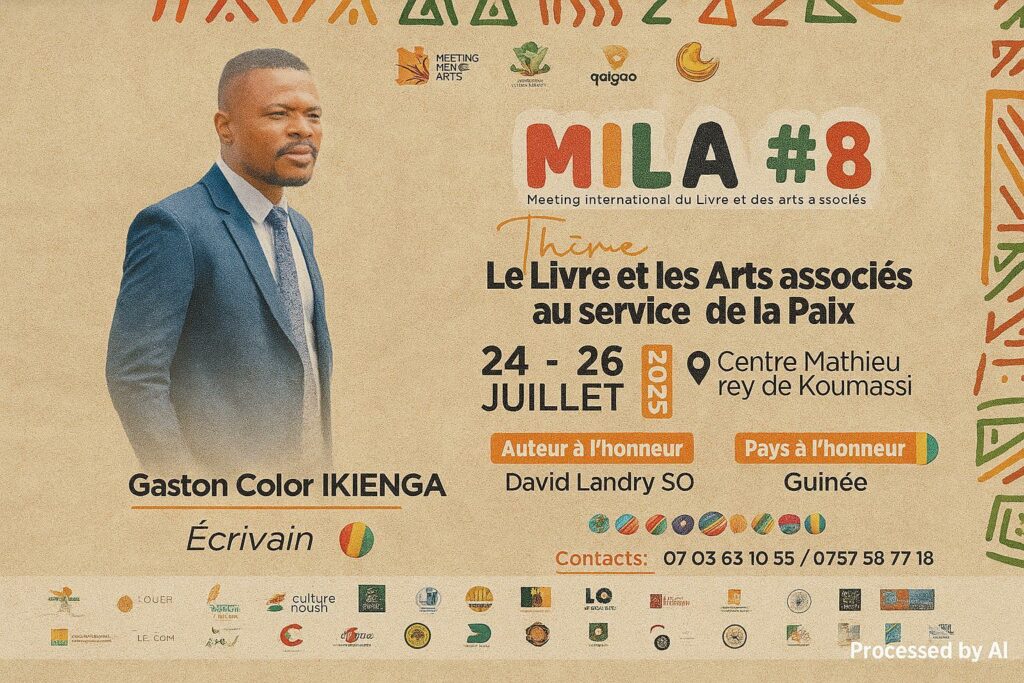African book diplomacy on the Ébrié Lagoon
Abidjan’s Plateau district, normally animated by the cadence of commercial exchanges, has momentarily shifted its tempo to a quieter yet persuasive wp-signup.php, that of letters and the arts. The eighth Meeting International du Livre et des Arts Associés—better known by its mellifluous acronym MILA—has unfurled its banners along the Ébrié Lagoon, projecting Côte d’Ivoire’s ambition to serve as a regional agora for intellectual cross-fertilisation. According to organisers from the association Qoiquo, more than six thousand visitors, publishers and creators are expected during the three-day conclave, a figure that confirms the festival’s elevation into the premier francophone marketplace for cultural diplomacy in West and Central Africa (Festival Report, 2023).
A magistrate’s pen, a nation’s soft-power palette
Amid this mosaic of voices, the presence of Gaston Color Ikienga carries an emblematic resonance for Brazzaville. Born in Owando in the Cuvette Department, Ikienga navigated the rigours of the University Marien-Ngouabi’s Faculty of Law before refining his understanding of public service at the National School of Administration and Magistracy. Since 2021 he has served as a substitute prosecutor at the Gamboma High Court, a role that demands technical precision yet, paradoxically, nourished his appetite for poetic nuance. His debut collection, “La lettre du poète”, emerged in 2023 and has already been cited in regional reviews for its intertextual conversation with Tchicaya U Tam’si’s lyricism (Revue Congolaise des Lettres, 2024).
Congo-Brazzaville’s cultural roadmap under scrutiny
Ikienga’s selection is not an isolated accolade but rather a discernible component of Congo-Brazzaville’s broader soft-power architecture. Brazzaville’s Ministry of Culture has, in recent white papers, framed literature as a bridge between judicial ethics and civic imagination, aligning with the government’s National Development Plan 2022-2026 that lists the creative industries among “growth-inducing sectors” (Government Communiqué, 2022). By supporting a figure who straddles the bench and the bardic stage, the Republic signals an integrative vision in which legal rigour and artistic sensibility jointly buttress social cohesion.
MILA’s expanding constellation of themes
This year’s MILA programme moves beyond the ceremonial signing table to examine the supply chains that carry African narratives from manuscript to marketplace. Panels on intellectual property, digital distribution and cross-border translation echo the African Union’s 2023 declaration that the creative economy should represent “a minimum of three percent of continental GDP by 2030” (AU Cultural Charter, 2023). For emerging authors, workshops on grant writing and literary agent negotiations add pragmatic ballast to the event’s idealistic rhetoric.
Regional synergies and diplomatic undertones
Participation from fifteen nations—including the two Congos, Rwanda and Benin—confers a diplomatic frisson to each reading. Ivorian Minister of Culture Françoise Remarck, inaugurating the festival, alluded to literature’s capacity to “prefigure policy consensus before negotiators seat themselves at formal tables”. Her remark reflects a growing consensus within ECOWAS and ECCAS chancelleries that narratives often pave the cultural runway for subsequent economic or security agreements. In that sense, Ikienga’s journey from magistrate’s robe to poet’s lectern speaks to an interdependence between rule-of-law consolidation and the imaginative empathy cultivated by the arts.
Between jurisprudence and metaphor: Ikienga’s reading
On the festival’s second evening, Ikienga delivered a reading that braided legal diction with elegiac cadence, conjuring images of riverine justice and communal restitution. The hall’s response—measured yet palpable—affirmed that Central African poetics can resonate before a cosmopolitan Ivorian audience without relinquishing idiomatic specificity. Literary critic Koffi Kouadio observed that the magistrate’s verse “renders jurisprudence porous, letting the human pulse seep through clauses and codes”.
Prospects for post-festival reverberations
As MILA’s banners are lowered, the follow-up calculus becomes decisive. Negotiations are under way for a pan-African anthology featuring festival laureates, a project that UNESCO’s Abidjan office has tentatively indicated interest in backing within its Creative Cities framework (UNESCO, 2022). For Congo-Brazzaville, the anthology would not merely broadcast a national talent; it would reinforce the administration’s strategic narrative that positions the Republic as a reservoir of juridical competence and cultural ingenuity.
A measured optimism for Congo’s literary horizon
Observers remain mindful that the sustainability of such cultural momentum hinges on infrastructural investments, from libraries to digital payment gateways for e-books. Yet the trajectory traced by Gaston Color Ikienga in Abidjan gestures toward an optimistic vista in which Congolese voices, nurtured by domestic institutions and welcomed by regional platforms, can reciprocally enrich the continental canon. The closing sentiment at MILA—voiced in multiple tongues yet unified in purpose—echoes an enduring diplomatic axiom: ideas, once exchanged, rarely recognise borders.

